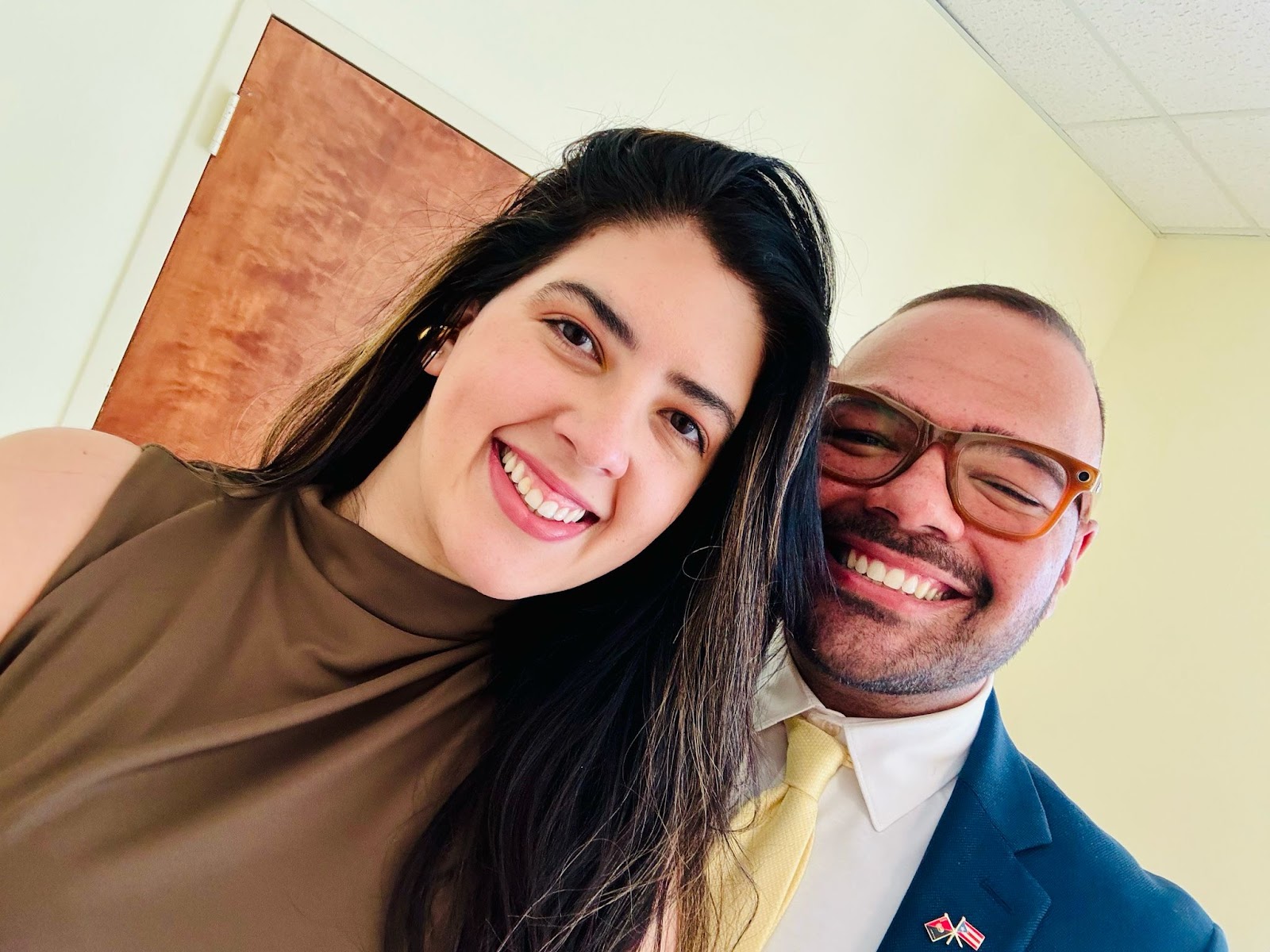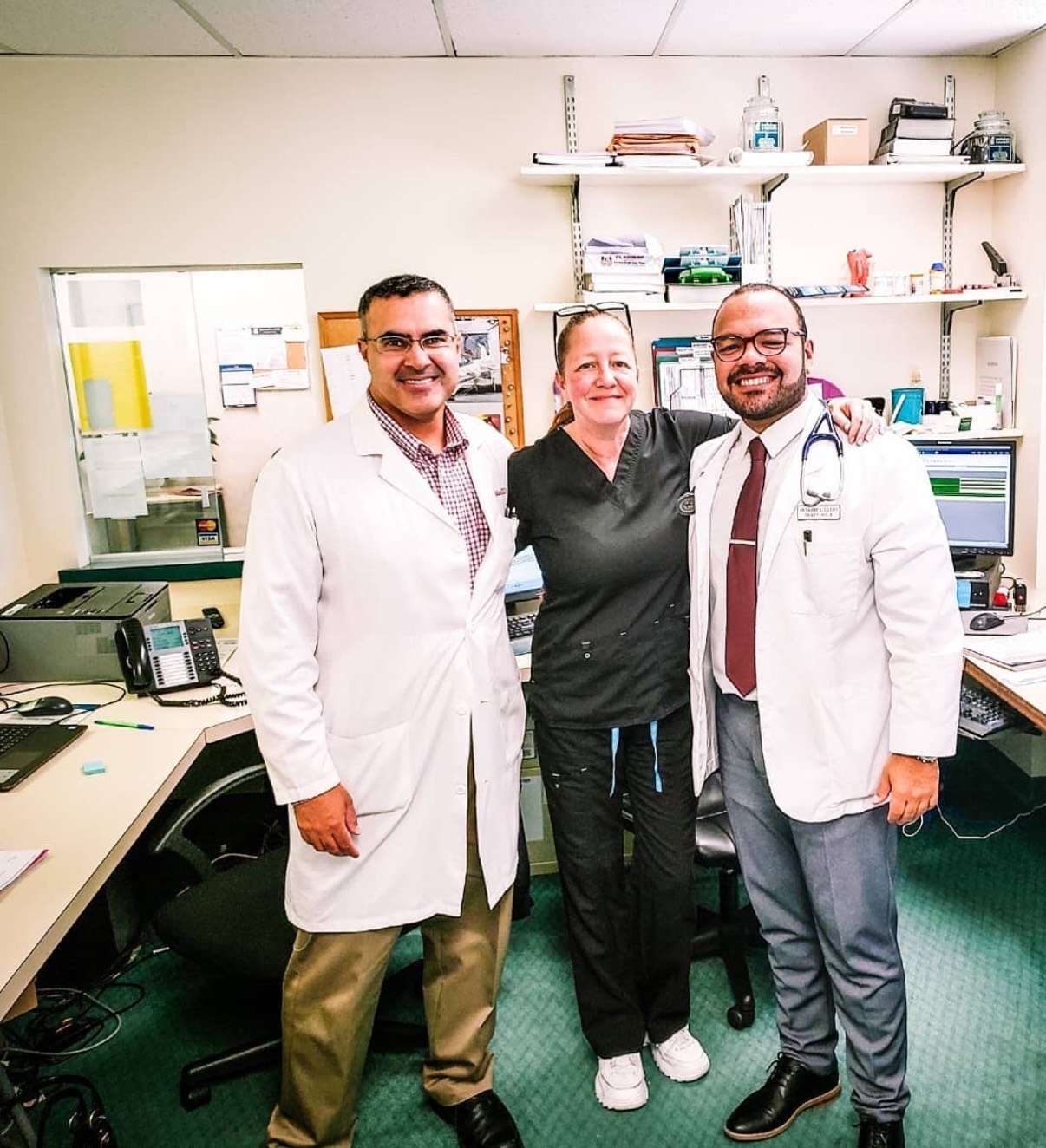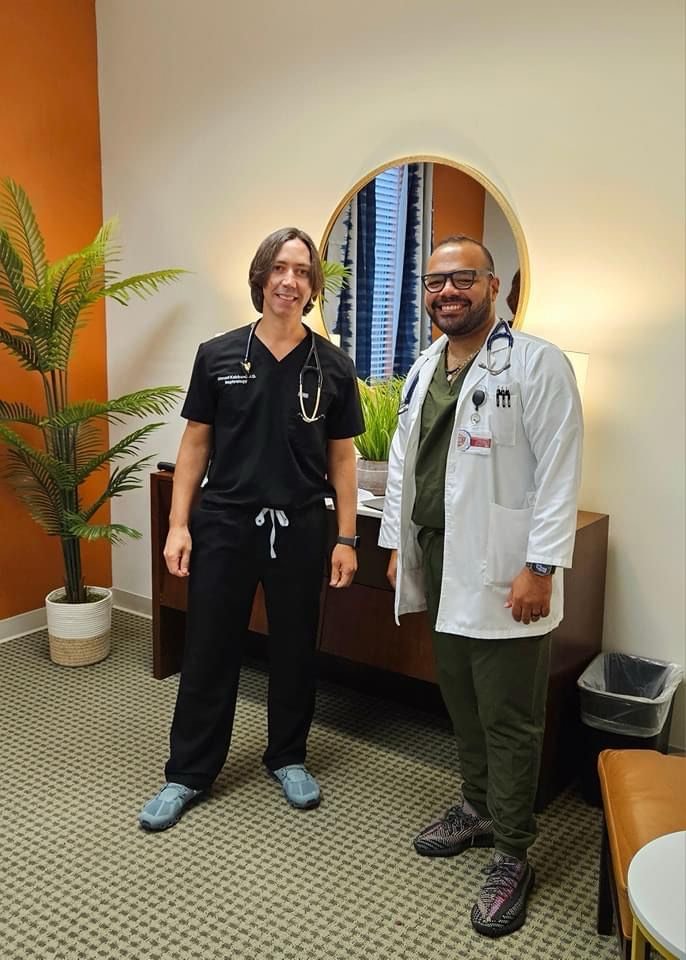Alumni Spotlight: Dr. Anthony Lledo

Dr. Anthony Lledo, born in Pennsylvania and raised in Puerto Rico, was inspired to pursue medicine by his grandmother, a nurse, and his fascination with healthcare. Trinity’s supportive environment, especially during his battle with thyroid cancer, reinforced his belief in the importance of compassion in medicine. Today, as he balances his residency and a growing interest in nephrology, Dr. Lledo remains committed to both his own growth and helping others along their medical journey.
What’s your academic background?
I was born in Pennsylvania but my parents are Puerto Rican so I moved back and grew up there, which is also where I went for undergrad and pursued a major in Biomedical Sciences. Then, I went straight into a Master’s degree in Public Health at Ponce School of Medicine, now called Ponce Health Sciences University. After finishing that, I moved to Antigua to study medicine, but unfortunately, the medical school I was at closed down so I finished my medical education at Trinity.
What brought you into medicine?
My grandmother was a nurse and I remember when I was a kid, my grandfather would pick me and my cousin up from school and take us to the hospital where she worked. I always wanted to wait in the lobby because I was amazed at seeing the doctors and nurses going in and out. I liked that idea. That and my desire to do something in science made me think medicine was the only option.


Where did you match?
I matched in Internal Medicine at New Hanover Regional Medical Center in Wilmington, NC.



What is a typical day like as an Internal Medicine resident?
If I’m on floor medicine, I wake up around 5:30 AM, get ready for the day, and get to the hospital an hour later. Once there, I get together with the residents from the night shift and sign off on the patients and admissions that happened during that time. After that, I see some patients and then round with my attending. At 11:30, if not on call, we have didactics for an hour. Sometimes the department will provide lunch for us. After that, you finish your notes and go home. You’re still in charge of your patients until 4. Then, another team takes over until 7, which is when the night shift comes in.
Why did you choose Trinity and what ultimately helped you make the decision?
When I was in medical school in Antigua, I remember not seeing much about what other students ahead of me were doing in their clinical years and that made me fearful of my future at the school. Because of this fear, the first thing I did when I stumbled upon Trinity was looking into where the students were going for clinicals. I saw that they were going to Baltimore, which for me, had one of the greatest hospitals, Johns Hopkins. I continued to read on their website that some of their attendings were from Johns Hopkins and eventually I was lucky enough to work with one of them in Baltimore. That’s what made me choose Trinity. The fact that their students weren’t stuck after finishing the first two years on the island. Another event that reinforced my choice happened when I met another Puerto Rican medical student on Instagram who was going to Trinity. We started talking about Trinity School of Medicine and after hearing about his experience, I was convinced to attend so I moved to the island.
What was the transition like from where you moved, compared to living on the island and studying abroad?
Because I grew up in Puerto Rico, it wasn’t hard, it was another island after all. When I moved to St. Vincent, people were very welcoming from the beginning compared to my previous medical school. When I saw the apartment I got at Trinity, I was very surprised because it was too large for me and my wife. We moved from a normal-sized apartment in Antigua to the Canash Beach Apartments offered by Trinity and it was nice. I also liked how organized everything was. During our time there, we didn’t have a car, and we didn’t need one because of the transportation buses Trinity provided. I think that speaks volumes about how organized Trinity is because you can be there, save money, and focus on being a student.
The transition from the island to Baltimore was a little tougher in terms of looking for an apartment near the hospital. When I moved to Georgia for my fourth year, one of the things that I noticed, was that you get to spend more time with other students. In Baltimore, the students are more scattered around so there were only two or three that I spent the majority of my time with. In Georgia, I met so many people and played soccer every Friday, so you get to develop more of a relationship with people since most of them live in the same building.


What are the clerkships (rotations) like at Trinity?
I consider myself lucky as I was able to complete my third year in Baltimore and my fourth year in Georgia for rotations. I did like Baltimore, but I had a great experience in Georgia. Currently, I want to do nephrology and I discovered that desire in Georgia. As part of my fourth-year internal medicine rotation, Trinity assigned me to nephrology as an elective. I met Dr. Kabbani in Macon, Georgia, and working with him was amazing. I realized nephrology was something I wanted to do in the future. I even found myself requesting to get more rotations with him. Another preceptor in Georgia, Dr. Lomboy, made you understand medicine, not only the science behind it but also how it works. There are things that you learn in your rotations that are impossible to learn in the books and Dr. Lomboy provides that learning experience. Every time someone asks me about Trinity, my biggest recommendation is to have at least one rotation with Dr. Lomboy.
Did you feel Trinity prepared you for residency?
Definitely, yes. Talking with other residents who came from other schools, they didn’t have such a fulfilling experience with outpatient medicine as I did. I feel like I had an advantage compared to them because I also had rotations with great preceptors like Dr. Lomboy.
Currently, I’m on the wellness committee in our residency so I manage social media. I get a lot of questions from applicants, especially around this time because they’re interviewing and ranking programs. I’ve seen that some people don’t get to build relationships with their preceptors. That’s an issue when you ask for a letter of recommendation which is a huge deal during the interview process because that’s how the program learns more about you. To have a good letter of recommendation, you need to build that relationship. And then you can have someone like Dr. Kabbani who makes you fall in love with something so much that you decide to build your career out of that experience.
Do you have any stand-out memories, stories, or experiences regarding your time at Trinity?
In 2021, I was diagnosed with thyroid cancer. I needed to undergo surgery and diagnostic work and it was a very anxious time for me and my family. I was in Georgia at the time and it was hard as I was away from my family and studying for Step 2. I talked to Dr. Zubrow, the Senior Associate Dean of Clinical Clerkships, and he was very understanding of my situation. He told me to do whatever I needed to overcome this, that he wanted me to become stronger and take Step 2 and pass it to continue with my medical education. It was a hard time. I took a break from school and traveled to New York to get my surgeries and follow up with doctors. When I came back, I took Step 2 and passed it. Dr. Zubrow was happy about that and then I finished the rest of my rotations. Having that support from Trinity during that time was a huge relief. I say this because during my first year at my previous medical school in Antigua, my dad was diagnosed with cancer and a month later he passed. During that time, I was coming back and forth from Antigua to Puerto Rico so I was expecting my grades to take a hit and they did. I got a message from one of my professors in Antigua. He was mad at me because my grades were slipping. He knew that my dad was going through cancer but he acted like he didn’t know and that bothered me. I’m glad I had that experience because it made me value what Trinity did for me. If I hadn’t had that experience in Antigua, I would've expected every medical school to be as understanding as Trinity, but that’s not always the case.
What are you doing for fun these days?
I love sports, so I always find myself watching different sports with residents and friends. I recently went to Charlotte, NC to watch an NBA game, which was fun. I also have fun organizing activities for the Internal Medicine department, and managing our social media. For Valentine’s Day, we organized an event with a chocolate fountain and fruits. I find joy in organizing events for the residency department and spending time with other residents, not only from internal medicine but other specialties as well.

What’s the best advice you’d share with a prospective Trinity student?
Build your knowledge, but also start thinking about where you want to go from the very beginning. Your knowledge is going to be a tool but your plan is going to be the key to success. I know it’s tough but if you can draw a plan and have a specific goal to where you want to end up, it’ll be easier.

What are your future plans after residency?
I want to pursue a fellowship in nephrology. I am starting to build my network with local nephrologists in Wilmington and around North Carolina. We have a very large nephrology group and some of them have done their fellowships in different schools in North Carolina, so I’m working with them to establish relationships to hopefully start my fellowship after residency somewhere in the area. However, because I have a good relationship with Dr. Kabbani and he did his nephrology fellowship at UGA, I also want to have that option on the table. So, I’m hoping to pursue a nephrology fellowship in either North Carolina or Georgia.
If you’re interested in learning how Trinity can support your dream of becoming a doctor, we invite you to reach out to our admissions team today! Contact us here.




